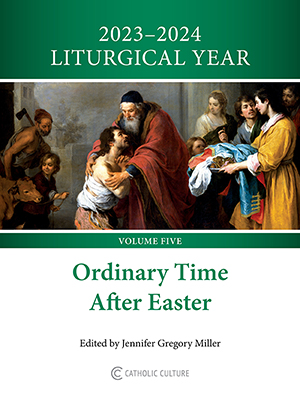Catholic Activity: Precious Coins: Mortification and Self-Denial
An excellent explanation on the importance of mortification and self-denial, especially during Lent, and the difference between the two.
DIRECTIONS
Every little boy and girl
That's born into this world alive
Is either a little Liberal
Or a little Conservative.
The comic poet is here suggesting that children acquire during earliest years the leanings, customs, habits that make character. Developing Christian character in our little Liberal, or little Conservative, depends upon two unpleasant words. Mortification. Self-denial.
For years I did not know the difference between them nor did I see them as distinct notions. Then I read that our Blessed Lord's life was devoid of mortification except for his forty day fast (after which he faced the onslaught of the tempter) and except for his keeping of the Mosaic penitential laws. His mortifications were for our edification. He did not need to perform acts of self-discipline (mortification), Christ, "the anointed one," was God. On the other hand, his life was one of constant self-denial from the manger of Bethlehem to the Cross of Calvary.
Subtle and elusive, self-denial, the opposite of self-love, is the sacrifice of our desires and pleasures. Self-denial is the daily cross that as soldiers of Jesus Christ we are bidden to carry.
"Like stars, like lilies in the sun," the self-denial pleas of Christ to his followers bejewel the Gospels: "Pray often — Love your enemies — Take my yoke — Give to the poor — enter the narrow gate — Do good — Be meek — Become like little children — Deny yourself — Take up your cross and follow me."
Mortification is not self-denial, but a means to it. Mortification is a "pruning job" of body and soul. "Every good branch he will prune that it may bring forth more fruit" (John 15:2).
Mortification brings under control our physical desires and passions; the means it uses are fasting, almsgiving, shame, humiliation, chagrin. Mortification keeps us obedient, humble, chastened; it makes us attentive when meeting with God. However, "perfection does not consist in macerating or killing the body, but in killing our perverse self-will," St. Catherine of Siena said centuries ago. And she was simply re-stating the thought of many Collects in the Lenten Masses.
Mortification leads to self-effacement, to self-denial. It is the condition of our discipleship in Christ, a genuine mark of mature holiness.
By self-denial children become docile, humble, responsive to God, and pliable material in his hands; he fashions them, by their little acts of self-denial, in the resplendent beauty of holiness.
We can teach our children by example to accept, in the spirit of the Cross, the "pain" of work at home and school; all small sufferings — the scraped knee, the football bruise, the ups and downs of social encounters.
Explain to your family the value of offering to God these tiny grains of self-denial. "We are asked to offer only what we have what we are today. It is our wafer of unleavened bread (to be offered to our heavenly Father in Mass). We must take one grain, the nearest at hand, a particular anxiety, a slight discomfort, an aching limb, an embarrassment. Offer that" (Caryll Houselander).
Harsh, austere as mortification and self-denial are, present them to children as precious coins. Or as acts of praise to God. Gerard Manley Hopkins, S.J. says this beautifully:
Turn then, my brethren, and give God glory. Thank and praise Him now for everything. When a man is in God's grace and free from mortal sin Then everything he does, so long as it has no sin in it, Gives glory to God. It is not only prayer that gives God glory, but work. Smiting an anvil, sawing a beam, whitewashing a wall, Driving horses, sweeping, scouring, Everything gives God some glory, If, being in His grace, you do it as your duty. To go to Communion worthily gives God great glory But to take food in thankfulness and temperance Gives Him glory too. To lift the hands in prayer gives God glory But a man with a dung fork in his hands, A woman with a slop pail Gives Him glory too. His is so great that all things give Him glory If you mean they should. So then, my brethren, live.
Activity Source: Holy Lent by Eileen O'Callaghan, The Liturgical Press, Collegeville, Minnesota, 1975






